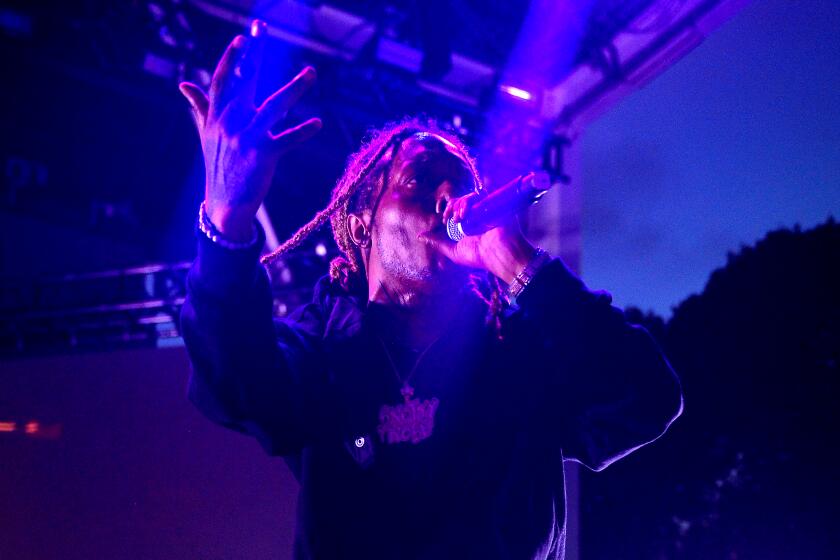Universal Sues Video Sharing Websites
Universal Music Group is suing two online video companies for alleged copyright infringement, signaling a new round of litigation aimed at sites that attract millions of viewers with quirky, short-form entertainment known as viral video.
The federal lawsuits alleged massive infringement by Grouper Networks Inc. and Bolt Inc. for permitting users to post without authorization hundreds of music videos from such popular artists as Mariah Carey, Mary J. Blige, 50 Cent and Black Eyed Peas. The sites have made “token, ineffective” steps to stem the infringement, Universal said.
“User-generated sites like Grouper and Bolt that derive so much of their value from the traffic that our videos, recordings and songs generate cannot reasonably expect to build their business on the backs of our content and the hard work of our artists and songwriters, without permission and without in any way compensating the content creators,” a Universal spokesman said.
Grouper Chief Executive Josh Felser said the Mill Valley, Calif.-based company expected to win the lawsuit.
“Our website is protected by federal law, and we’re vigilant about taking down copyrighted content when we’re properly notified,” he said in a statement.
Bolt Media President Jay Gould posted a message on the New York-based company’s website asking users to refrain from uploading copyrighted music videos.
“We understand the love you have for your favorite musical artists,” Gould wrote, “but Bolt respects rights of copyright owners such as Universal Music and their artists.”
The lawsuits were filed Monday in U.S. District Court in Los Angeles. Analysts had predicted a flood of copyright lawsuits in the wake of Google’s $1.65-billion deal to purchase online video giant YouTube. Some observers said media companies would probably target several of YouTube’s smaller competitors to establish a legal precedent.
“This is the new battleground for content owners like Universal,” said Greg Korn, a copyright lawyer with Kinsella Weitzman Iser Kump & Aldisert in Los Angeles.
Record labels are testing the provisions of the Digital Millennium Copyright Act of 1998, which provide special protections known as “safe harbors” to Web-hosting sites that remove copyrighted works after receiving takedown notices from the content owners.
“If they can win some judgments saying these little sites are not protected by safe-harbor rules, then they have all the leverage in the world to dictate licensing terms to sites that until now have not proactively enforced copyright but have instead chosen to rely on rights holders’ takedown notices,” wrote Internet billionaire Mark Cuban last week on his blog, forecasting the lawsuits.
Grouper’s network lets people watch, share and create video for the Web. Its website ranks user-submitted video according to the most viewed, most discussed, the highest rated and the most passed around.
In the lawsuit, Universal said Grouper compounded the infringement by formatting the videos so that they could be downloaded to a personal computer, posted to a website, e-mailed to friends or transferred to a portable devices such as Apple Computer Inc.’s iPod or Sony Corp.’s PlayStation Portable game system.
Universal said Grouper also potentially pitted it against Sony Pictures Entertainment, which paid $65 million for the online video site in August. Universal said it would reserve the right to add Sony as a defendant.
Sony Pictures CEO Michael Lynton has downplayed the risks of a lawsuit by noting that Grouper complies with the copyright act’s provisions for removing copyrighted works.
“I’m not concerned about it,” said Lynton after Sony bought Grouper. “If it’s brought to our attention, and it is copyrighted material, it’s taken off the site.”
Lynton did not comment Tuesday.
Copyright attorney Korn said entertainment companies such as Universal would aggressively enforce copyrights since cutting licensing deals with video sites such as YouTube. Universal, the world’s largest music company, can’t afford to have some sites providing videos free that others pay for, he said.
“As the licensing opportunities open up with sites like YouTube, the content owners like Universal now have increased incentives to go out and police their intellectual property to protect the value of license,” Korn said.
Universal Music has been the most vocal about enforcing its rights, with Chief Executive Doug Morris hinting that it might sue YouTube before striking a licensing deal last week.
Peter Jaszi, an American University law professor, said the outcome of this latest online copyright battle could have broad implications -- especially if it refined the language of the copyright act.
“This isn’t just viral video that’s affected,” Jaszi said. “The implications for this for the future of the Internet are potentially much broader. There’s all kinds of Web hosting that could be affected by this.”
*
More to Read
The biggest entertainment stories
Get our big stories about Hollywood, film, television, music, arts, culture and more right in your inbox as soon as they publish.
You may occasionally receive promotional content from the Los Angeles Times.






